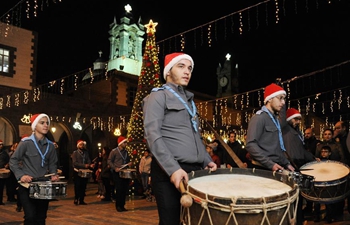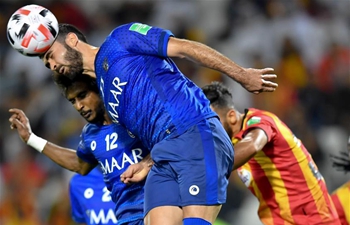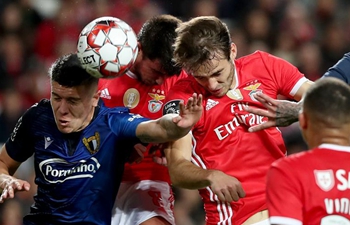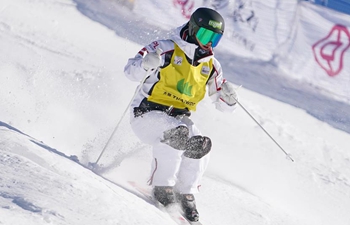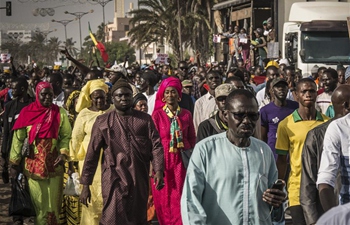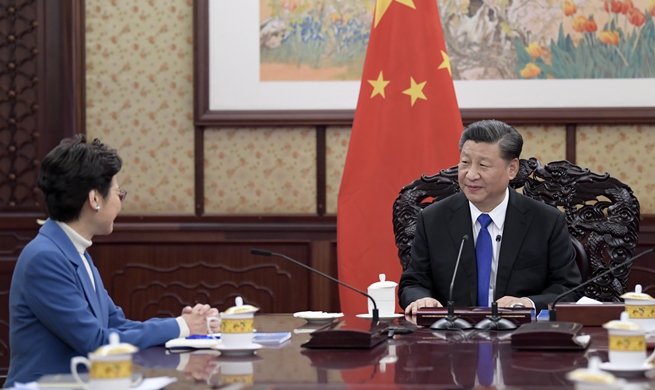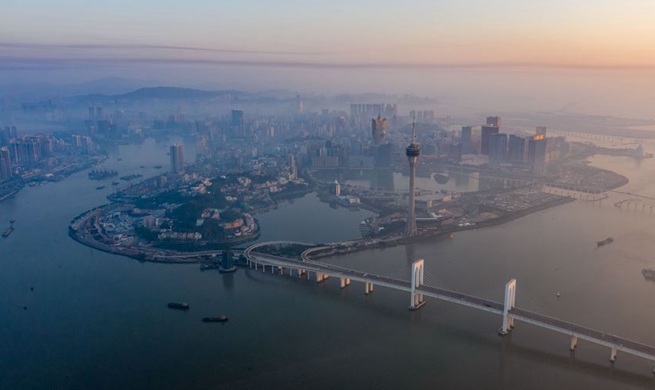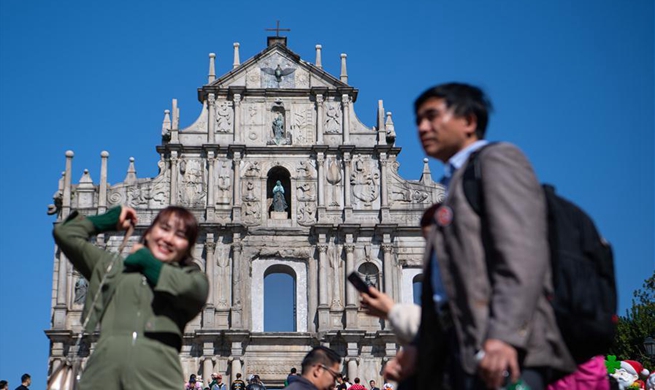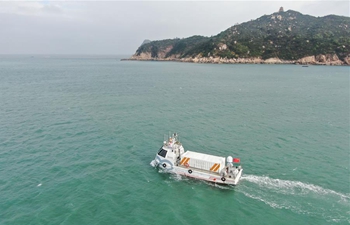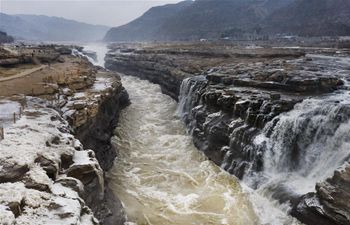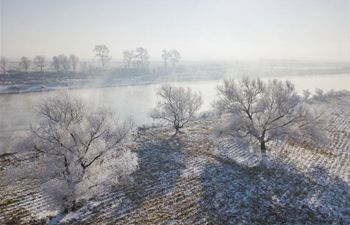by Sportswriters Zhang Han, Wang Jingyu
BEIJING, Dec. 16 (Xinhua) -- Two years away from the first ever Winter Games on home soil, China's winter sports vie for changes while progressing in the hunt to win gold in several events.
Trusted with the 2022 Winter Olympic Games by the International Olympic Committee (IOC) in 2015, can the Chinese capital of Beijing witness another boast of winter sports following the breakthroughs at Vancouver Games?
While China frequently ranks in the top three at the Summer Olympic Games, the world's most populous country has not been so dominant at the winter event, only once finishing in the top 10 in Vancouver in 2010 and placing a lowly 16th at last year's edition in PyeongChang with just one gold.
However, with plans for the country to compete in all the 2022 Games' 109 disciplines, an unprecedented achievement if completed, the Chinese winter sports administrators turn to intern reforms in seeking of rapid progress.
A NEW HEAD FOR SHORT TRACK & SPEED SKATING
On May 23, four-time Olympic short track speed skating champion Wang Meng was announced the head coach of a new Chinese national team formed by the merger of the country's short track and speed skating squads.
The appointment of former women's 500m and 1,000m short track specialist Wang ends the 13-year tenure of her predecessor Li Yan at the helm of China's short track team.
Having historically been a happy hunting ground for China's Winter Olympians, the short track has contributed 10 out of a total of 13 gold medals that Chinese athletes have won at the past five Winter Olympics. However, the team failed to win a single title at this year's World Championships in March.
"It's a thoughtful decision to appoint Wang Meng to this important position," said Ni Huizhong, director of China's Winter Sports Management Center.
"Hopefully, Wang can lead the young squad to new heights, and the young coach will be fully trusted and widely supported," Ni added.
Wang, who turns 35 in July, was named head coach of the country's speed skating team in April, before the Winter Sports Management Center decided to increase the scope of her role.
Less than a month later, South Korean national head coach Kim Sun-tae took the helm of the Chinese short track speed skating team, as Wang Meng revealed.
"We have invited many international coaches and staff to help the Chinese speed skating team. Mr. Kim has been appointed as the head coach of the short track team," said Wang.
Over a dozen of foreign coaches and staff have joined the Chinese national short track team including Derrick Campbell of Canada. Rutger Tijssen of the Netherlands has been appointed as the head coach of the Chinese speed skating team with both Kim and Tijssen reporting to Wang Meng.
Under Wang's guide, the Chinese speed skating team, which bagged nothing in all international events last season, harvested some medals in men's mass start, 1,000m and 500m, among which came the 20-year-old Ning Zhongyan winning the men's 1,500m title in Kazakstan World Cup.
On short track, the Chinese team claimed eight gold, six silver and seven bronze medals in the past four World Cups of this season's ISU premier series, though Olympic champion Wu Dajing suffering a fairly down season finding his form.
In the Shanghai stop, China collected a 2-2-2 performance despite being ousted from three relays and an injured Wu Dajing.
"I didn't expect much here," Wang commented after the tourney. "To me, it is just a World Cup. It's not an Olympic Games; It's not a World Championships. Our aim is the World Championships next year."
A BRAND NEW CURLING SQUAD
China's greatest ever curler Wang Bingyu, known as Betty to the curling world, set the bar for Chinese curlers by winning the nation's first world medal, a silver, in 2008, before upgrading that a year later and adding a bronze two years later.
However, with Wang and her generation retiring from the sport as athletes, the country has been eight years away from a podium-finish from both the women's and the men's side, whose best performance was the fourth in 2008.
Yet ambitious targets set for the new national body of the sport and began their quest for a most successful Winter Olympics in Beijing with two key appointments in the middle of this year.
On May 21, Wang Bingyu took on a new role as the curling program director on the organizing committee for the 2022 Beijing Winter Olympic Games.
A month later, Sweden's Peja Lindholm was named the new national coach for China after building some unstoppable Swedish sides over the past nine years.
Despite having little interaction, Wang and Lindholm are both aiming for one common goal - inspiring the next generation of Chinese curlers.
"As a former famous curling athlete, I believe that I have an obligation to make a contribution to the development of curling," said Wang.
Lindholm, on the other hand, started his selection for the national side with a pool of hundreds of potential hopefuls before bringing the numbers down to 48 and then roughly 30.
"In the beginning I want to focus on their physical levels so we know for sure that they have a good athletic base to start from.
"Once they have all the physical skills that we expect them to have, then we move onto the curling drills and other exercises like that. It's so we know that they have great technique and improve their tactical level as well," he said.
"At this moment, we're not focusing on being the next world champions. We're focusing on the long-term - to be on top at the Olympics," stated the Swede.
As a result of half-year efforts from all sides involved in China's curling, the women's team composed of Han You, Zhang Lijun, Jiang Xindi and Zhao Ruiyi won the Pacific-Asia Curling Championships in November to make sure a berth to next year's world championships, the best result in five years, while the men's side earned a spot in the worlds qualifications after finishing the third in the same tournament.
Earlier this month, the Chinese duo Yang Ying and Ling Zhi emerged from 28 pairs to qualifying for the 2020 world mixed curling championship with just four places on offer at the qualifying tourney.
LUCKY IN FIGURE SKATING BUT UPHILL BATTLE IN SKIING
Two-time world champions Sui Wenjing and Han Cong won their first pairs gold in the ISU Grand Prix final in Turin on December 6, eight months after their world championships victory in Japan, the only gold that Chinese winter sports athletes had in a disappointing 2018/19 season.
Their teammates Peng Cheng and Jin Yang were beaten to the second place by a deficit of 7.42 points, while world junior champions Anastasia Mishina and Aleksandr Galliamov of Russia were edged to the third.
It has been an out-of-expectation good result for the Chinese figure skating, which hit the peak in Vancouver nine years ago with a historical gold taken by Shen Xue and Zhao Hongbo, now respectively the chairwoman of the Chinese figure skating association and head coach of the Chinese team.
Zhao, however, noted it was a lucky victory for the national team, emphasizing the unmatchable potential of their Russian counterparts and the weak of China's men's and women's skating as well as that of ice dancing.
"Our top male skater Jin Boyang finished fifth at the Finals, a distance performance from the world's best, Patrick Chan and Yuzuru Hanyu," said Zhao. "Wang Shiyue and Liu Xinyu were the fourth in ice dancing at Cup of China, their best result and highest placing in a World Cup."
"This means we are making progress, but far from becoming a competitive force in the world," he added.
Comparing to the sports on ice, China are just making baby steps in snow sports, except a few freestyle skiing events.
The 17-year-old free-ski sensation Zhang Kevin continued her upbeat form in recent two years, winning the season opener in Cardrona, New Zealand in September and finishing fourth in the recent halfpipe World Cup at Copper Mountain of the United States.
Geng Wenqiang ranked 11th out of 27 competitors at the opening race of the 2019/20 World Cup in Lake Placid, United States, a best ever result for Chinese skeleton athletes.
As the host nation of Beijing 2022, China hopes to reap more than five gold medals and to compete in all the 109 events, but neither objective would be easily achieved, according to a winter sports expert in an exclusive interview with Xinhua in April. It stays the same at the end of the year.
Zhu Chengyi, a former official from China's General Administration of Sport, told that arduous preparation would be required in order to meet those goals.
"In order to surpass the five-gold mark, we have to make breakthroughs in other events, and not rely solely on our traditional strongholds," Zhu said, referring to the hopefuls in short track, figure skating, skiing aerials, halfpipe and speed skating.
As for competing in all 109 events, "We're quite sure of qualifying for some 60 events, but have to make greater efforts in order to reach the Olympic qualifying standards in the other 50 events," Zhu said.
With just two years left until Beijing 2022, China is standing at a critical juncture. "In order to meet our goals, we must work together and ensure our preparation is thorough," Zhu concluded.




